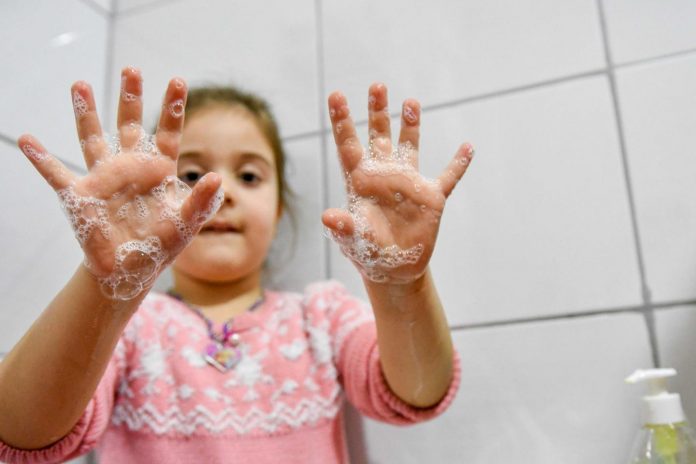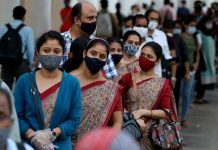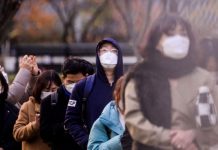COVID-19, discovered in December 2019, quickly became a global pandemic. Doctors and researchers continue to learn more about it every day. Now, safe and effective vaccines and boosters are recommended for many children and teens.
While the virus continues to spread, everyone should stay up to date with their vaccines. COVID-19 vaccines work to protect you from getting sick. Based on what is known about COVID-19 vaccines and other recommended vaccines for kids, people who are up to date with their vaccines are well protected from getting seriously sick or having other health problems.
Here’s what we know now and how you can protect your family and others.
Symptoms of COVID-19
Symptoms of COVID-19, which is caused by the SARS-CoV-2 virus, range from mild to severe and generally begin 2-14 days after being exposed to the virus. Someone with these symptoms may have COVID-19:
fever and chills
a cough
shortness of breath or difficulty breathing
muscle or body aches
headache
fatigue
new loss of taste or smell
sore throat
congestion or runny nose
nausea or vomiting
diarrhea
Which children are at highest risk?
According to the U.S. Centers for Disease Control (CDC), unvaccinated children seem to be at higher risk for getting severely ill with COVID-19. Some children with special health care needs also may be at higher risk, including those with chronic medical conditions such as:
Obesity
Conditions that weaken the immune system
Sickle cell disease
Heart disease or congenital heart conditions
Lung disease (including asthma)
Diabetes
Neurodevelopmental disorders such as cerebral palsy
Chronic kidney disease
Complex medical conditions, including some that require breathing or feeding tubes, or home ventilators.
If you are concerned about your child’s symptoms, call your pediatrician right away.
Does COVID-19 affect children the same way as adults?
Many children with COVID-19 have mild symptoms or have no symptoms at all, and most children with COVID-19 infection have recovered. However, some have become severely ill and have been hospitalized, and some have died. In addition, like adults, some children and teens with COVID-19, even with few or no symptoms, have developed post-COVID conditions such as long-haul COVID.
How to protect your family
Here are a few things you can do to keep your family healthy:
Get COVID-19 vaccines for all family members who are eligible. Vaccines are now recommended for adults and children ages 5 years and up. Vaccines for children under 5 years old may be authorized next. Clinical trials continue for vaccines that could be given to children as young as six months old.
Get boosted if eligible. If it has been at least five months since their last COVID vaccine, kids 5 years and older should get a Pfizer-BioNTech COVID-19 booster. Some immunocompromised children aged 5 through 11 years old should get an additional dose of the Pfizer-BioNTech COVID-19 vaccine to complete the primary series.
Avoid crowds, poorly ventilated spaces, and keep a safe physical distance from people outside your household.
Anyone over age 2 should wear a well-fitting face mask in public. Universal mask wearing is also recommended in schools by all students, teachers, staff, and visitors.
Follow local and state guidance on travel restrictions.
Wash your hands often with soap and water for at least 20 seconds. If soap and water are not available, use hand sanitizer that is 60% or higher alcohol-based.
Teach kids to cough and sneeze into a tissue (make sure to throw it away after each use!) or into their arm or elbow, not their hands. Avoid touching your face; teach your children to do the same.
Clean and disinfect your home as usual using regular household cleaning sprays or wipes. Wash stuffed animals or other plush toys, following manufacturer’s instructions in the warmest water possible and dry them completely.
Are there medicines to treat or prevent COVID-19 in babies, children or teens?
The Food and Drug Administration has given emergency use authorization for monoclonal antibody therapies to treat mild to moderate COVID symptoms in some adults, adolescents, children or infants. They may help block the SARS-CoV-2 virus from entering cells and make it easier for the body to destroy the virus.
Only one monoclonal antibody therapy for children (sotrovimab) may be effective against the omicron variant. There is a very limited supply of this medicine. To be considered for sotrovimab, adolescents must be age 12 or older and weigh at least 88 pounds; have had symptoms of SARS-CoV-2 infection and a positive COVID test for less than 10 days; and be at high risk of getting very sick from COVID-19, but not yet hospitalized.
Some children at high risk for severe illness from COVID-19 may be eligible for monoclonal antibody treatment to protect them before they are exposed to the virus. If your child is high risk and you are concerned about them being exposed to COVID, call your pediatrician to discuss if this is an option.
Another option that is authorized for people at high risk of severe COVID illness is oral antiviral medication (paxlovid and molnupiravir). One of these antivirals is authorized for children as young as 12 years, but it is too soon to know how well it works in children.
What about home remedies?
Home remedies families may hear about on social media, such as ivermectin, azithromycin and hydroxychloroquine/chloroquine are NOT proven effective against COVID-19 and can be toxic if used incorrectly.
How to care for someone in your family with COVID-19
People who are mildly ill with COVID-19 are usually able to isolate at home during their illness. However, it may be recommended to take these additional steps:
Separate family members with COVID-19 from others as much as possible. The person with the virus should stay in a specific room and away from other people in your home. Ideally, they should use a separate bathroom, if available. Limit visitors in the house.
Avoid contact with pets. This includes petting, snuggling, being kissed or licked, and sharing food.
Call ahead before visiting the doctor. This will help them take extra steps to keep other people from getting infected or exposed.
Avoid sharing personal household items. Don’t share dishes, drinking glasses, cups, eating utensils, towels, or bedding with other people or pets in the home. After using these items, they should be washed thoroughly with soap and water.
Extra cleaning for all “high-touch” surfaces. These include counters, tabletops, doorknobs, bathroom fixtures, toilets, phones, keyboards, tablets, and bedside tables. Also, clean any surfaces that may have blood, stool, or body fluids on them. Use a household cleaning spray or wipes and follow the instructions on the label.
Monitor symptoms. Call your doctor or 911 right away if the illness gets worse.
In children, the goal should be to improve their overall comfort, monitor their activity, look for signs of serious illness, and make sure they drink enough liquids.
For questions about over-the-counter medication such as ibuprofen or acetaminophen, call your pediatrician. As with any medication, be sure to use the syringe or dropper that came with the product to measure the correct amount. Never use a kitchen measuring spoon to dose liquid medicine.
Talk to children about COVID-19 facts
News coverage and disinformation posted online about COVID-19 can be frightening to kids. Parents and other adults who work closely with children to filter information and talk about it in a way that their child can understand. These tips can help:
Simple reassurance. Remind children that researchers and doctors have been closely following the virus throughout the pandemic and their recommendations on vaccines, boosters, masks and other safety steps will help keep them and everyone else safe.
Give them control. It’s also a great time to remind your children of what they can do to help.
Monitor their media. For older children, talk together about what they are hearing on the news and correct any misinformation or rumors you may hear by going to reputable sources for information—including your pediatrician! Keep young children away from frightening images they may see on TV, social media, and other sources.
Watch for signs of anxiety. Children may not have the words to express their worry, but you may see signs of it. They may get cranky, be more clingy, have trouble sleeping, or seem distracted. Keep the reassurance going and try to stick to your normal routines.
Be a good role model. COVID-19 doesn’t discriminate, and neither should we. When you show empathy and support to those who are ill, your children will too.































